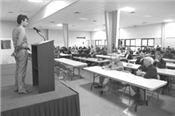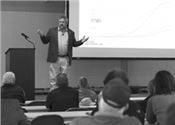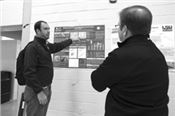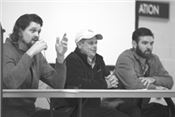|
AgCenter Holds Digital Agriculture Conference

Thanos Gentimis, an assistant professor in the LSU AgCenter Department of Experimental Statistics, speaks
at the inaugural AgCenter digital agriculture conference at the State Evacuation Shelter near Alexandria
on Jan. 29, 2019.
ALEXANDRIA, LA.
Farmers were encouraged to take advantage of new data-driven technologies at the LSU AgCenter digital agriculture conference Jan. 29 at the State Evacuation Shelter near Alexandria.
About 90 people came to event, which was part of a new push at the AgCenter and the LSU College of Agriculture for more education and research on using technologies that record and interpret data to make farming more efficient and profitable.
“We’re moving toward designing a program that fits our students of tomorrow,” said Rogers Leonard, AgCenter associate vice president. “But we can’t forget about the farmers that are out there today.”
More events are being planned to help farmers understand the massive data sets gathered by tools such as harvest yield monitors, remote sensors and drone cameras, he said.
At the conference, AgCenter engineer Randy Price said yield monitors, which come standard on most new combines, are a good place to start for those interested in using data to make better choices on the farm. A farmer could use the monitor’s data to map yields across a field and identify areas that are less productive, for example.
Modern combines record data not just on yield but also fuel usage, elevation and location.
“That’s a lot of information at your fingertips,” but it has no value on its own, said AgCenter agent R.L. Frazier. “The value comes in what you do with the data.”
Farmers will need to cooperate with academics and industry professionals to make sense of data collected on their farms, said Thanos Gentimis, an assistant professor in the AgCenter Department of Experimental Statistics. He teaches a class aimed at training students to use ag data.
Sharing data can help farmers and researchers alike, said Luciano Shiratsuchi, an associate professor in the AgCenter School of Plant, Environmental and Soil Sciences.
A bigger pool of data improves research projects and the resulting recommendations, he said. And farmers can benefit from the expertise of someone who can translate data into an action item, like applying varied rates of fertilizer according to the needs of different parts of a field.
Making data available to others – like firms that specialize in ag data interpretation – is an opportunity for success, said Terry Griffin, an economist with Kansas State University.
“It’s not just what you would do,” Griffin said. To be competitive, today’s farmers also need to know about what their neighbors, other farmers, retailers and ag companies are doing – and patterns that emerge in large data sets can offer insight.
Several speakers at the conference emphasized that moving into the digital agriculture era requires investing both time and money. During a panel discussion, farmers B.J. Duckworth and Mead Hardwick described the learning curve they had to overcome when they first began studying data from their farms to evaluate and adjust their practices.
Farmers who don’t yet own the latest data-tracking tools need to consider their goals and budget carefully before rushing to the equipment dealership, said AgCenter economist Michael Deliberto.
“It certainly gives producers the ability to be more efficient in input use,” he said. Those potential savings, however, won’t necessarily be enough to justify the cost of the latest gadgets and machines.
They also won’t do much to help a farmer who has neglected more important things, like planting crops on time, Griffin said.
“If you’re not doing well in the basics, adding some of these technologies will not help,” he said.
The conference also featured a poster session that highlighted LSU student research and a vendor fair. ∆

Terry Griffin, an economist with Kansas State University, explains a graph showing adoption rates among Kansas farmers of various technologies during his presentation at the inaugural LSU AgCenter digital agriculture conference at the State Evacuation Shelter near Alexandria on Jan. 29, 2019.
Photos by Olivia McClure/LSU AgCenter

Alejandro Castro, a graduate student in the LSU School of Plant, Environmental and Soil Sciences, talks with a visitor about his research poster at the inaugural LSU AgCenter digital agriculture conference at the State Evacuation Shelter near Alexandria on Jan. 29, 2019.

Farmer B.J. Duckworth, left, makes a point as he takes part in a panel discussion along with crop consultant Ryan Viator,
center, and farmer Mead Hardwick, right, during the inaugural LSU AgCenter digital agriculture conference at the
State Evacuation Shelter near Alexandria on Jan. 29, 2019.
|
|